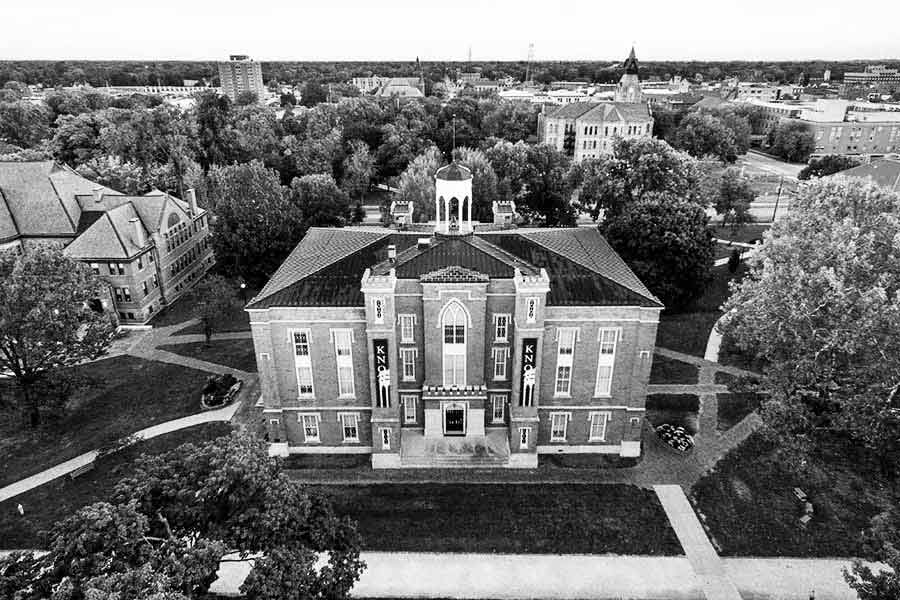Knox Stories
Familial Knox Teammates Share Success During Women’s Basketball Season
Strong team chemistry was one of the key reasons for their success this season.

Office of Communications
2 East South Street
Galesburg, IL 61401


In the decades before the Civil War, the founders of Knox College preached and took action against slavery, and we are proud of that shared heritage. But we must acknowledge the unfinished work, especially on our own campus. Time and again, Black students, faculty, and staff of color have marched and petitioned, demanding that the College take meaningful action to address racial discrimination and injustice at Knox. Last February, students addressed the Board of Trustees and the administration, detailing the many and painful ways in which the College does not live up to its rhetoric on racial justice. In confronting the Board, they stood in a long line of student activists who have sought change. From the 1968 founding of Allied Blacks for Liberty and Equality, to the 1985 student sit-in, to the Diversity Initiative walkout in 2014, to Ariyana Smith’s protest after the death of Michael Brown, to last winter’s Board of Trustees demands, students and their allies on the faculty and staff have spoken out forcefully for justice. And each time, changes have been made, but many entrenched patterns of inequality and racism at Knox remain in place.
When the pandemic forced the College to close in March, members of our community dispersed across the country, with many of us continuing to resist in our home communities. Now, as we return to Knox and begin the 2020 academic year, it is essential that we turn our attention to anti-racist actions that will address these continuing inequities on our own campus. These past few months have pushed racial injustice ever more to the forefront, strengthened activists, and grown the Black Lives Matter movement across the country and abroad. We hope that the long overdue reckoning has now arrived nationally and are committed to playing our part on this campus.
We are grateful to the student activists who have shared their pain, expended emotional energy, and given up countless hours to this call for justice. Their stories are important markers of the breadth and depth of the work we need to do. Over the summer, work by the Campus Diversity Committee, Academic Affairs, and Student Development staff has focused on anti-racism education and training and on the recruitment and retention of faculty and staff of color. We write today to share with you some actions the College will be taking over the coming months.
Last academic year, the Campus Diversity Committee, composed of students, faculty and staff, selected Safe Colleges' Implicit Bias and Microaggression Awareness on Campus as the baseline online training program for all faculty and staff. This program provides skills for understanding the impact of microaggressions, communicating inclusively, and recognizing unconscious bias. All faculty and staff are required to complete this training by October 31, and will be hearing more about how to access that training in the coming weeks.
Additionally, the Campus Diversity Committee has developed workshops that will be delivered in person as COVID-19 restrictions permit, and remotely when in-person sessions are not possible. These workshops are designed to 1) allow faculty and staff to engage with the College’s diverse student body in a thoughtful and respectful manner, 2) contribute to the recruitment and retention of a diverse College workforce, and 3) equip faculty and staff with skills to engage in critical dialogue around issues of race and racism. Workshop topics include:
The first workshop, addressing microaggressions, was the focus of the Fall Faculty Conversation on September 10. Additional workshops for other campus constituents will be scheduled throughout the fall term and the remainder of the academic year, and will be delivered in part by external anti-racism experts.
This year’s incoming class will participate in two diversity and inclusion workshops at the start of the term. During remote new student orientation they were introduced to critical concepts including social identity, power, and privilege, anti-racism, and dialogue. Once we are able to meet in person, they will participate in a second program that challenges them to think deeply about their biases, perceptions, and stereotypes, and equips them with tools to challenge racism on campus and contribute to a more equitable community.
As new students begin the required First-Year Preceptorial (FP) course this fall, they will engage in conversations about the required summer common reading, Claudia Rankine’s Citizen: An American Lyric. Though originally published in 2014, the book provides an unflinching portrayal of the experience of racial difference in America that remains vitally relevant in 2020 and demands our participation and responsibility to engage in the process of reflection on racial imagery and microaggressions. In collaboration with Intercultural Life, FP instructors spent the summer developing a curriculum around Citizen that engages students critically with issues of race and community confronting American society.
Intercultural Life will continue to offer anti-racism and other diversity and inclusion-focused educational programs for all students—new and returning—throughout the academic year. All community members are encouraged to explore the collection of anti-racism resources assembled by Intercultural Life.
The Knox student body reflects the diversity of the nation. By contrast, the current representation of diverse identities among our faculty and staff lags our student demographic. We have taken some important steps to reform our search processes, but we understand that it is not enough. That work must be built upon, expanded and institutionalized more concretely in order to create the sustained change needed.
With the aim of a comprehensive review and reform of our faculty hiring practices, the Provost and Dean of the College is working with faculty committees, our faculty development program, and each department to review current practices and implement changes in a coordinated way.
This review and reform focuses on four areas:
Similar work will be done to ensure that staff positions also come to reflect the diversity of our student body, and we will report on that work in the coming months. For example, beginning this fall, all search committees for staff positions will be provided with anti-bias training as well.
Some of you may know that Knox College collaborates on a number of programs with the Associated Colleges of the Midwest (ACM) consortium. This year, the consortium has launched a collaborative anti-racism initiative that will bring together faculty, staff, and students from all the 14 ACM members to address the structural and institutional forms of racism that have caused communities of color on our campuses to have differential experiences. We will write more about that initiative in another message, but the primary elements of the project are 1) training for faculty and staff to develop anti-racism skills and knowledge; 2) community building to create cohorts among the communities of color across our campuses, including student affinity groups; and 3) data collection and analysis to help define the landscape for racial equity on our campuses. While these activities cannot substitute for the hard work we must do at Knox, comparative perspectives and lessons from other campuses will provide valuable insights for our own work.
As part of our ongoing commitment to systematically dismantling implicit bias and structural racism in College policies and practices, we will be convening an Anti-Racism Task Force made up of students, faculty, and staff. The Task Force will advise both the Campus Diversity Committee and the College’s senior leadership. We will be soliciting members for the Task Force in the coming weeks. This group’s work will be at times difficult and time consuming, and critically important to our campus community. In acknowledgement of this, members will be compensated for their participation.
Accountability is a critical component of meaningful change. To that end, we will conduct periodic campus climate surveys to better understand the realities and experiences of people of color on campus, and to elicit the voices of all members of the campus community regarding their experiences with racism. Data from these surveys will be broadly shared in aggregate form and used to improve the College’s anti-racism initiatives. Development of the climate instrument is under way, and we will be reporting on that work later this fall. Other surveys such as exit interviews for departing faculty, staff, and students and metrics such as percentages of faculty and staff of color will inform our work, as well. The ACM data collection and analysis will prove especially helpful as we seek to measure our progress.
We have talked a great deal about how the current pandemic is requiring us to do things differently at Knox. But the impact of systemic racism also requires that we change ourselves and create a new Knox that truly promotes equity and justice. The responsibility for change lies primarily with those of us who have benefited from the systemic advantages that are the outcomes of systemic racism. We ask that you all join in this project on which so much depends at this pivotal moment in our history.
Sincerely,
Teresa Amott, President
Anne Ehrlich, Vice President for Student Development
Paul Eisenmenger, Vice President for Finance and Administrative Services
Steve Hall, Vice President and Chief Information Officer
Beverly Holmes, Vice President for Advancement
Michael Schneider, Provost and Dean of the College
Paul Steenis, Vice President for Enrollment and Dean of Admission
Published on September 15, 2020